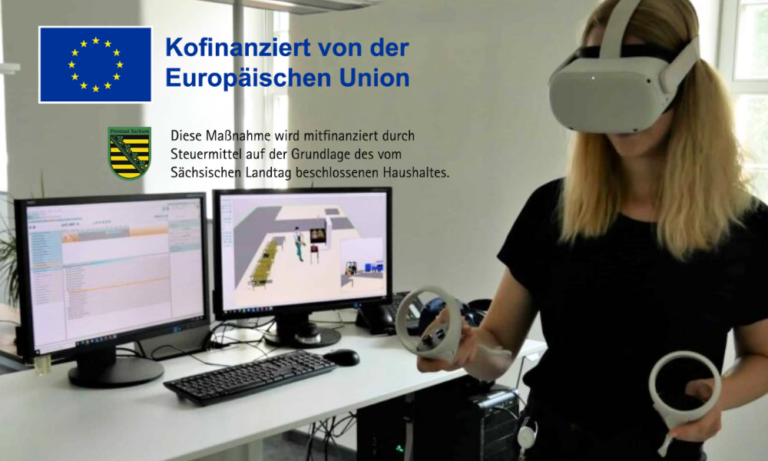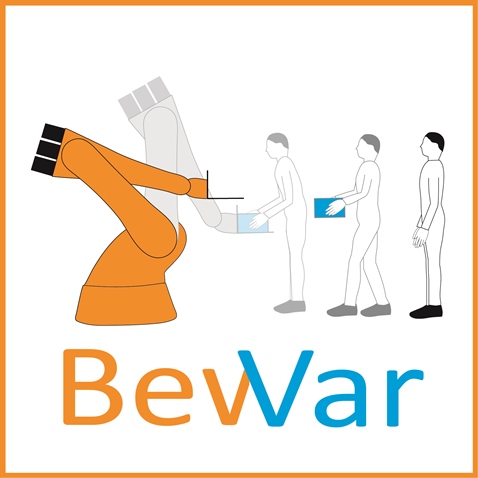imk - partner for national and international research projects. creative - innovative - future-oriented
imk Industrial Intelligence GmbH is a future-oriented company. The research for innovative ideas, methods and concepts is one of the cornerstones of the company.
The modern company headquarters in a historic setting offers our teams an inspiring and modernly equipped environment, making it the ideal place for research and development at the highest level. Thus, imk has already proven itself in numerous projects as a competent, flexible and reliable research partner of public institutions and industrial partners on a national and international level.
A large part of the research and development takes place within the framework of funded projects, which are supported by national and European funding agencies. We have summarized the current research and development activities for you.

By hiring an "innovation assistant" through the STEM specialists funding program, we want to maintain our technological lead in the field of human simulation.

Realization of a high-rate capable stacking process with the four sub-projects automated dual stacking, process monitoring, low-hydrogen testing and disassembly and repair of stacks.

The further development of possibilities for human-machine collaboration is currently one of the central research topics in Germany and Europe. The goal of these approaches is ...

Exploring methods to study and evaluate exoskeletons using markerless motion capture and 3D human models for virtual planning of manual work processes.

Developing robotic technologies to improve human comfort and confidence in automation in hybrid human-robot manufacturing environments.

Development of an integrated IT service and technology bundle with which a (semi)-automatic process analysis is carried out according to time management and ergonomic criteria

Investigation of human motion variance for the validation of MRK processes in the planning simulation incl. implementation of the motion variances in the planning tool ema

Development of a prediction model for the determination of joining forces and their ergonomic and economic evaluation and design based on emaWD under ...
You can request an electronic copy (.pdf) of individual publications via the contact form.
Ullmann, S. (2021). Use of digital human models for ability-oriented work design for employees with performance changes. Dissertation. Dresden University of Technology. https://nbn-resolving.org/urn:nbn:de:bsz:14-qucosa2-760296
Bauer, S., Sylaja, V. J., Fritzsche, L. & Ullmann, S. (2019). Task-based digital human simulation with Editor for Manual Work Activities - Basic functionalities, applications and future works. In S. Scataglini & G. Paul (Eds.), DHM and Posturography (pp. 57-62). London, UK: Elsevier.
Fritzsche, L., Ullmann, S., Bauer, S. & Sylaja, V. J. (2019). Task-based digital human simulation with Editor for Manual Work Activities - Industrial applications in product design and production planning. In S. Scataglini & G. Paul (Eds.), DHM and Posturography (pp. 569-575). London, UK: Elsevier.
Wegge, J., Emmermacher, A., Döbler, A., Fritzsche, L., Kügler, J. & Nowak, J. (2018). Work ability, work motivation, and leadership of older employees: state of the research and new developments. In F. Knieps & H. Pfaff (Eds.), BKK health report 2018 (pp. 190-201)). Berlin: MWV.
Leidholdt, W., Fritzsche, L. & Bauer, S. (2016). Editor of human work (ema) - From the digital human model to the virtual skilled worker. In A. C. Bullinger-Hoffmann and J. Mühlstedt (Eds.), Homo Sapiens Digitalis - Virtual ergonomics and digital human models (pp. 355-362). Wiesbaden: Springer Vieweg.
Spitzhirn, M.; Aust, A.; Bullinger-Hoffmann, A.C. (2016). Digital human models as a method for teaching work processes. In: Breit, H.; Bullinger-Hoffmann, A.C.; Cantner, U. (eds.), Productivity of industrial services in operational practice. Methodology, dogmatics and discourse (pp. 145-162). Wiesbaden: Springer Gabler. ISBN 978-3-658-08632-9
Spitzhirn, M.; Bullinger-Hoffmann, A.C. (2016). A requirements analysis of digital human models as an instrument for ergonomic work process design. In: Bullinger-Hoffmann A.C.; Mühlstedt J. (Eds.), Homo Sapiens Digitalis - Virtual ergonomics and digital human models (pp. 229-245). Wiesbaden: Springer Vieweg. ISBN 978-3-662-50459-8
Bauer, S. (2015). Process language-based system for controlling digital human models as a subcomponent of software for planning and visualizing human work in the digital factory. Dissertation, Chemnitz University of Technology. Online at: https://d-nb.info/1213814502/34
Fritzsche, L. (2010). Work Group Diversity and Digital Ergonomic Assessment as New Approaches for Compensating the Aging Workforce in Automotive Production. Dissertation, Dresden University of Technology.
Fritzsche, L. (2008). Suitability of mobile augmented reality technologies in industrial production - A laboratory study on physical and mental stress and strain in full-shift operation. Saarbrücken: VDM Verlag Dr. Müller.
Fritzsche, L., Bengler, K. & Spitzhirn, M. Digital human modeling - Quo vadis, Homo Sapiens Digitalis?. Z. Arb. Wiss. 76, 395-397 (2022). https://doi.org/10.1007/s41449-022-00347-1
Niehaus, S., Ajoudani, A., Bianchi, M. Durandau G., Fritzsche, L., Gaertner C., Refai, MR., Sartori, M., Wang, H., Wischniewski, S. (2022). Human-centered design of robotic systems and exoskeletons using digital human models within the research project SOPHIA. Z. Arb. Wiss. 76, 450-458. https://doi.org/10.1007/s41449-022-00335-5
Spitzhirn, M., Benter, M., Heindl, C. Heindl, C., Scheder, N., Strohmeier, F., Behrendt, W. (2022). Hybrid work systems-platform-based work planning-designing productive and human-centered work processes. Z. Arb. Wiss. 76, 489-509. https://doi.org/10.1007/s41449-022-00342-6
Spitzhirn, M., Liedtke, M., Grün, G. Matheis, C. (2022). Simulation of work environment factors for human-oriented and efficient workplaces. Z. Arb. Wiss. 76, 416-439. https://doi.org/10.1007/s41449-022-00337-3
Spitzhirn, M., Ullmann, S., Fritzsche, L. (2022). Considering individual abilities and age-related changes in digital production planning - human centred design of industrial work tasks with ema software. pp. 459-477. Z. Arb. Wiss. 76. https://doi.org/10.1007/s41449-022-00343-5
Schmalzl, T., Colienne, A., Bywater, E., Fritzsche, L., Gärtner, G., Bellmann, M., Reimer, S. & Ernst, M. (2021). A Passive Back-Support Exoskeleton for Manual Materials Handling: Reduction of Low Back Loading and Metabolic Effort during Repetitive Lifting. IISE Transactions on Occupational Ergonomics and Human Factors. https://doi.10.1080/24725838.2021.2005720
Latella, C., Tirupachuri, Y., Tagliapietra, L., Rapetti, L., Schirrmeister, B., Bornmann, J., Gorjan, D., Camernik, J., Maurice, P., Fritzsche, L., Gonzalez-Vargas, J., Ivaldi, S., Babic, J., Nori, F. & Pucci, D. (2021). Analysis of Human Whole-Body Joint Torques During Overhead Work With a Passive Exoskeleton. IEEE Transactions on Human-Machine Systems, 1-9. https://doi.org/10.1109/THMS.2021.3128892
Ullmann, S. & Fritzsche, L. (2021). Use of digital human models for ability-oriented work design: examples from practice. ASU: Occupational Medicine, Social Medicine, Environmental Medicine: Journal of Medical Prevention, 56(10), pp. (594-597).
Fritzsche, L., Galibarov, P., Gärtner, C., Bornmann, J., Damsgaard, M., Wall, R., Schirrmeister, B., Gonzalez-Vargas, J., Pucci, D., Maurice, P., Ivaldi, S. & Babič, J. (2021). Assessing the efficiency of exoskeletons in physical strain reduction by biomechanical simulation with AnyBody Modeling System. Wearable Technologies, 2, E6. https://doi.org/10.1017/wtc.2021.5
Ajoudani, A. et al. (2020). Smart Collaborative Systems for Enabling Flexible and Ergonomic Work Practices. Industry Activities. IEEE Robotics & Automation Magazine, 27(2), 169-176. DOI: 10.1109/MRA.2020.2985344.
Fritzsche, L., Spitzhirn, M. & Gärtner, C. (2020). Analysis of exoskeletons with biomechanical simulation. ASU: Occupational Medicine, Social Medicine, Environmental Medicine - Journal of Medical Prevention, 55(8), 470-474.
Maurice, P., Camernik, J., Gorjan, D., Schirrmeister, B., Bornmann, J., Tagliapietra, L., Latella, C., Pucci, D., Fritzsche, L., Ivaldi, S. & Babic, J. (2020). Objective and Subjective Effects of a Passive Exoskeleton on Overhead Work. IEEE Transactions on Neural Systems and Rehabilitation Engineering, 28(1), 152-164. Online ISSN: 1558-0210, DOI: 10.1109/TNSRE.2019.2945368.
Ranavolo, A., Ajoudani, A., Cherubini, A., Bianchi, M., Fritzsche, L., Iavicoli, S., Sartori, M., et al. (2020). The Sensor-Based Biomechanical Risk Assessment at the Base of the Need for Revising of Standards for Human Ergonomics. Sensors, 20(20), 5750. MDPI AG. Retrieved from http://dx.doi.org/10.3390/s20205750
Otto, C., Trepte, J., Ullmann, S. (2019). Digital production planning using human simulation. Digital Engineering, 22(6), pp. 30-31.
Ullmann, S., Spitzhirn, M., Fritzsche L. (2019). Virtual work design. Occupational Medicine, Social Medicine, Environmental Medicine: Journal of Medical Prevention, 54(10), pp. 639-642.
Wolf, A., Miehling, J., Quadrat, E., Nolte, A., Fritzsche, L., Bauer, S., Spitzhirn, M., Peters, M., Leidholdt, W., Wischniewski, S. & Wartzack, S. (2019). Virtual planning and evaluation of human work. ASU: Occupational Medicine, Social Medicine, Environmental Medicine - Journal of Medical Prevention, 54(6), 372-375.
Fritzsche, L. & Ullmann, S. (2018). Ergonomics 4.0: Current trends and challenges in ergonomic work design. Betriebspraxis & Arbeitsforschung, 234, pp. 49-52.
Fritzsche, L., Wach, D., Jungmann, F. & Wegge, J. (2017). On the importance of faultlines as boundaries in teamwork. Group. Interaction. Organization. Journal of Applied Organizational Psychology (GIO), 48(2), 127-135.
Fritzsche, L., Wegge, J., Schmauder, M., Kliegel, M. & Schmidt, K.-H. (2014). Good ergonomics and team diversity reduce absenteeism and errors in car manufacturing. Ergonomics, 57(2), 148-161.
Schaub, K. G., Mühlstedt, J., Illmann, B., Bauer, S., Fritzsche, L., Wagner, T., Bullinger-Hoffmann, A. C., Bruder, R. (2012). Ergonomic assessment of automotive assembly tasks with digital human modeling and the 'ergonomics assessment worksheet' (EAWS). International Journal of Human Factors Modeling and Simulation, 3, 398-426.
Fritzsche, L. (2010). Ergonomics risk assessment with digital human models in car assembly: Simulation versus real-life. Human Factors and Ergonomics in Manufacturing & Service Industries, 20, 287-299.
Kampmeier, J., Cucera, A., Fritzsche, L., Brau, H., Duthweiler, M., & Lang, G. K. (2007). Suitability of monocular augmented reality technologies in automotive production. Klinische Monatsblätter für Augenheilkunde, 224, 590-596.
Spitzhirn, M., Gärtner, C., Ullmann, S. & Fritzsche L. (2023). Considering Individual Abilities and Age-Related Changes in Digital Production Planning Using Digital Human Models. In: S. Scataglini et al. (Eds.): DHM 2023, LNNS 744, pp. 1-10, 2023. https://doi.org/10.1007/978-3-031-37848-5_28
Spitzhirn, M., Gärtner, C. & Fritzsche F. (2023). Digital planning of ability-appropriate and productive human-robot interactions in production. IEEE International Conference on Advanced Robotics and Its Social Impacts (ARSO), Berlin, Germany, 2023, pp. 166-171, https://doi.org/10.1109/ARSO56563.2023.10187520
Spitzhirn, M., Benter, M., Heindl, C., Scheder, N., Strohmeier, F., Behrendt, W. (2023). Hybrid Work Systems - Platform-based work planning for the design of productive and ergonomic work processes. In Gesellschaft für Arbeitswissenschaft (ed.) Frühjahrskongress 2023 Hannover, Nachhaltig Arbeiten und Lernen - Analyse und Gestaltung lernförderlicher und nachhaltiger Arbeitssysteme und Arbeits- und Lernprozesse, (1-6, paper B.5.8). Dortmund: GfA-Press.
Spitzhirn, M., Öttler, E., Kaiser, A., Atitallah, BB., Kanoun, O. (2023). Recording joining forces using robots for the ergonomic evaluation of work processes. In Gesellschaft für Arbeitswissenschaft (ed.) Frühjahrskongress 2023 Hannover, Nachhaltig Arbeiten und Lernen - Analyse und Gestaltung lernförderlicher und nachhaltiger Arbeitssysteme und Arbeits- und Lernprozesse, (1-6, paper B.6.17). Dortmund: GfA-Press.
Spitzhirn, M., Fritzsche L., Weidhas M. (2023). Ergonomics in the digital factory - Combined use of 3D human simulation, virtual reality and motion capturing. In Gesellschaft für Arbeitswissenschaft (ed.) Frühjahrskongress 2023 Hannover, Nachhaltig Arbeiten und Lernen - Analyse und Gestaltung lernförderlicher und nachhaltiger Arbeitssysteme und Arbeits- und Lernprozesse, (Workshop). Dortmund: GfA-Press.
Schmailzl, M., Spitzhirn, M., Eder, F., Krüll G., Linner, T., Obergrießer, M., Albalkhy, W., Zoubeir, L. (2023). "Towards interfacing human centered design processes with the AEC industry by leveraging BIM-based planning methodologies", 40th International Symposium on Automation and Robotics in Construction (ISARC), 2023, Chennai, India. DOI: https://doi.org/10.22260/ISARC2023/0045
Wolf, M., Dilena, M., Spitzhirn, M., Ramsauer, C. (2023). Development of a Training Module for Virtual Workplace Design and Evaluation in the LEAD Factory (June 5, 2023). Available at SSRN: https://ssrn.com/abstract=4470042 or http://dx.doi.org/10.2139/ssrn.4470042
Fritsche, L. & Spitzhirn M. (2022). Prospective design of age-appropriate workplaces in the care sector. In Society for Ergonomics (ed.) Spring Congress 2022, Magdeburg. Technology and education in hybrid working environments. Dortmund: GfA-Press.
Spitzhirn, M., Pollmer, S., Kaiser, A., Ben Atitallah, B. & Kanoun O. (2022). Determination of joining forces and their influencing variables as a basis for digital work process evaluation. In Society for Ergonomics (ed.) Spring Congress 2022, Magdeburg. Technology and education in hybrid working environments. Dortmund: GfA-Press.
Spitzhirn, M. & Ullmann, S. (2022). Economic and ergonomic design of work processes using digital factory and work planning. In Society for Ergonomics (ed.) Spring Congress 2022, Magdeburg. Technology and education in hybrid working environments. Dortmund: GfA-Press.
Spitzhirn, M., Ullmann, S., Bauer, S. & Fritzsche, L. (2022) Digital production planning and human simulation of manual and hybrid work processes using the ema Software Suite. In: Proceedings of the 7th International Digital Human Modeling Symposium 7(1), August 29-31, 2022, Iowa City, Iowa, USA, p.20-32. doi: https://doi.org/10.17077/dhm.31816
Kemter, A.; Winkler, R.; Kotte, H.; Müller, H.; Wegge, J.; Fritzsche, L.; Spitzhirn, M.; Ullmann, S.; Dietz, C.; Knoll, M.; Zacher, H.; Uhlmann, L.-M. (2021). Challenges and opportunities of digitalization for successful ageing at work and in retirement. Designing work HUMAINE, 67th Spring Congress of the Society for Ergonomics: GfA-Press.
Fritzsche, L. (2021). Ergonomics 4.0 - Challenges and opportunities of Industry 4.0 for the design of humane workplaces. 26th Interdisciplinary Scientific Conference Mittweida. Mittweida: Mittweida University of Applied Sciences. www.doi.org/10.48446/opus-12302
Fritzsche, L., Funk, M., Rosen, P., Spitzhirn, M. & Wischniewski, S. (2021). Simulation and participatory design of HRI work systems in the SOPHIA project. In Society for Ergonomics (Ed.), Designing work HUMAINE. (pp. 1-6, contribution 10.4). Dortmund: GfA-Press.
Fritzsche, L., Gärtner, C., Spitzhirn, M., Galibarov, P., Damsgaard, M., Maurice, P. & Babič, J. (2021). Assessing the efficiency of industrial exoskeletons with biomechanical modeling - Comparison of experimental and simulation results. In: N. L. Black et al. (Eds.): IEA 2021, LNNS 223, pp. 353-357, 2022. https://doi.org/10.1007/978-3-030-74614-8_43
Fritzsche L., Schönherr, R., Ullmann, S. & Spitzhirn, M. (2021). Use of digital human models for skill-oriented work design using practical examples. ASIM Symposium 2021: Simulation in Production and Logistics.
Fritzsche, L., Spitzhirn, M. & Ullmann, S. (2021). Prospective design of age-appropriate workplaces using adapted human models and 3D simulation. In Gesellschaft für Arbeitswissenschaft e. V. (Ed.), 67th Spring Congress of the Society for Ergonomics: Designing work HUMAINE. Dortmund: GfA-Press.
Kommenda, T., Spitzhirn, M., Spinner, C. & Schlund S. (2021). Economical human-robot work system design: Experiences from PCB assembly. ZWF Journal of Economic Factory Operation 116(10):657-661. DOI:10.1515/zwf-2021-0092
Spitzhirn, M., Fritzsche, L. & Bauer, S. (2021). Digital Production Planning of Manual and Semi-automatic Tasks in Industry Using the EMA Software Suite. In: N. L. Black et al. (Eds.): IEA 2021, LNNS 223, pp. 415-419, 2022. https://doi.org/10.1007/978-3-030-74614-8_52
Fritzsche, L., Rönnau, C. & Spitzhirn, M. (2020). Further development of the cost-benefit assessment for ergonomic measures: Literature study on the influence on work motivation and job satisfaction. In Gesellschaft für Arbeitswissenschaft (Ed.), Digital change, digital work, digital man? (1-6, contribution C.2.1). Dortmund: GfA-Press.
Fritzsche, L., Spitzhirn, M. & Gärtner, C. (2020). Development of a method for the evaluation of exoskeletons using the biomechanical human model AnyBody. In Gesellschaft für Arbeitswissenschaft (ed.), Digital change, digital work, digital man? (1-6, article B.8.2). Dortmund: GfA-Press.
Spitzhirn, M. & Kaiser, M. (2020). Virtual planning of human-robot collaboration using ema Work Designer - economic and ergonomic design of human-robot interactions. In Gesellschaft für Arbeitswissenschaft e. V. (Ed.), 67th Spring Congress of the Society for Ergonomics: Designing Work HUMAINE. (pp. 1-6, contribution B.14.4). Dortmund: GfA-Press.
Ullmann, S. & Fritzsche, L. (2020). Development of a methodology for capability-oriented work design for employees with changed performance with the help of digital human models. In Gesellschaft für Arbeitswissenschaft (ed.), Digital change, digital work, digital man? (1-6, contribution C.4.6). Dortmund: GfA-Press.
Fritzsche, L., Hölzel, C. & Spitzhirn, M. (2019). Further development of cost-benefit assessment for ergonomics measures using practical examples from the automotive industry. In Gesellschaft für Arbeitswissenschaft (Ed.), Work interdisciplinary - analyzing, evaluating, designing. (pp. 1-6, contribution A.7.2). Dortmund: GfA-Press.
Peters, M., Quadrat, E., Nolte, A., Wolf, A., Miehling, J., Wartzack, S., Leidholdt, W., Bauer, S., Fritzsche, L. & Wischniewski, S. (2019). Biomechanical digital human models: opportunities and challenges to expand ergonomic evaluation. In T. Ahram et al. (Eds.). 1st International Conference on Human Systems Engineering and Design: future trends and applications (pp. 885-890). CHU-Université de Reims Champagne-Ardenne, France.
Spitzhirn, M. & Ullmann, S. (2019). Studies on movement variance in the execution of work processes and their integration into the human model ema. In Gesellschaft für Arbeitswissenschaft e. V. (Ed.), 65th Spring Congress of the Society for Ergonomics: Analyzing - evaluating - designing work in an interdisciplinary way. (pp. 1-6, contribution C.4.5). Dortmund: GfA-Press.
Spitzhirn, M., Ullmann, S., Harsch, A.-K. & Bdiwi, M. (2019). Consideration of the variance of human walking paths in the planning simulation of production processes of human-robot collaboration In M. Putz & A. Schlegel (Eds.), Conference Proceedings 18th ASIM Conference Simulation in Production and Logistics, Chemnitz 2019 ASIM Conference: Simulation in Production and Logistics. Auerbach: Publishing house Wissenschaftlicher Scripten.
Ullmann, S. (2019). Methodology for ability-oriented work design for employees with changed performance with the help of digital human models. Doctoral workshop as part of the 65th Spring Congress of the Society for Ergonomics: Analyzing - evaluating - designing work in an interdisciplinary way.
Gonzales Marin, A., Shourijeh, M., Galibarov, P., Damsgaard, M., Fritzsche, L. & Stulp, F. (2018). Optimizing contextual ergonomics models in human-robot interaction. In IROS 2018 - IEEE/RSJ International Conference on Intelligent Robots and Systems. October 1-5, Madrid, Spain.
Illmann, B., Fritzsche, L., Goldhahn, L. & Kaiser, N. (2018). Methods for the economic evaluation of ergonomics measures. In Gesellschaft für Arbeitswissenschaft (Ed.), ARBEIT(s).WISSEN.SCHAF(f)T - Basis for management & competence development (pp. 1-6, contribution C.6.5). Dortmund: GfA-Press.
Ullmann, S. & Fritzsche, L. (2018). Implementing age-related performance factors and individual performance limitations in the ema human model. In Gesellschaft für Arbeitswissenschaft (Ed.), ARBEIT(s).WISSEN.SCHAF(f)T - Basis for management & competence development (pp. 1-6, Contribution B.6.4). Dortmund: GfA-Press.
Ullmann, S., Fritzsche, L. & Morlok, F. (2018). Identifying movement variances during manual tasks in the vertical plane for integration into digital human models. In Gesellschaft für Arbeitswissenschaft (Ed.), ARBEIT(s).WISSEN.SCHAF(f)T - Basis for management & competence development (pp. 1-6, contribution A.8.3). Dortmund: GfA-Press.
Spitzhirn, M. & Ullmann, S. (2017). Virtual Aging - Ability-oriented work design with ema. Expanding the editor of human work to include age-related changes in human performance. Conference proceedings IIC 2017. 26.09.2017 to 27.09.2017, Chemnitz (pp. 1-35)
Spitzhirn, M. (2017). Integration of age-related changes in mobility for age-appropriate work process design in digital human models. In: Gesellschaft für Arbeitswissenschaft e.V. (Ed.), Socio-technical design of digital change - creative, innovative, meaningful, 63rd Congress of the Gesellschaft für Arbeitswissenschaft. (S. 1-6). Dortmund: GfA-Press
Spitzhirn, M. & Bullinger, A.C. (2017). Integration of age factors in digital human models for age-appropriate work process design. In: Gesellschaft für Arbeitswissenschaft e. V. (Ed.), Sociotechnical design of digital change - creative, innovative, meaningful, 63rd Congress of the Gesellschaft für Arbeitswissenschaft. (S. 1-6). Dortmund: GfA-Press
Ullmann, S. & Fritzsche, L. (2017). Work design for performance-changed employees with digital planning tools. In Gesellschaft für Arbeitswissenschaft (Ed.), Socio-technical design of digital change - creative, innovative, meaningful (pp. 1-6, contribution D.1.7). Dortmund: GfA-Press.
Ullmann, S. & Fritzsche, L. (2017). Ergonomic work design for older and performance-restricted workers using digital human models. In S. Wischniewski & D. Bonin (Eds.), Proceedings of the 5th International Digital Human Modelling Symposium (pp. 100-109). Dortmund/Berlin/Dresden: Federal Institute for Occupational Safety and Health. doi:10.21934/baua:bericht20170816 (online)
Ullmann, S. & Fritzsche, L. (2016). Designing ergonomic workstations for people with restricted abilities using EMA simulation software. In A. Sušić, T. Jurčević Lulić, I. Salopek Čubrić, D. Sumpor and G. Čubrić (Eds.), Proceedings of the 6th International Ergonomics Conference IEA 2016, Zadar, Croatia (pp. 361-364). Zagreb: Croatian Ergonomics Society.
Ullmann, S. (2016). Implementation of individual performance prerequisites as parameters for digital human models for ability-oriented work design for employees with changing performance. Doctoral workshop as part of the 62nd Spring Congress of the Society for Ergonomics: Work in complex systems - digital, networked, human?
Ullmann, S. & Fritzsche, L. (2016). Designing ergonomic workstations for people with restricted abilities using EMA simulation software, In Croatian Ergonomics Society (ed.), Book of Proceedings: 6th International Ergonomics Conference: ERGONOMICS 2016 - FOCUS ON SYNERGY. Zagreb: Croatian Ergonomics Society.
Ullmann, S. & Fritzsche, L. (2016). Virtual Aging - Use of 3D technologies for the preventive design of demographically resilient workplaces. In A. C. Bullinger (Ed.) 3D SENSATION - transdisciplinary perspectives (pp. 424-431). Chemnitz: aw&I Science and Practice.
Gläser, D., Fritzsche, L., Bauer, S & Sylaja, V. J. (2015). Optimized motion generation and semantic process description - Interim results of the INTERACT research project. In Gesellschaft für Arbeitswissenschaft (Ed.), Responsibility for the work of the future (pp. 1-5, contribution B.2.4). Dortmund: GfA-Press.
Illmann, B., Fritzsche, L. & Ullmann, S. (2015). Holistic risk assessment with digital human models - The integration of environmental conditions in the digital factory. In Gesellschaft für Arbeitswissenschaft (ed.), Responsibility for the work of the future (pp. 1-5, article A.2.7). Dortmund: GfA-Press.
Ullmann, S., Fritzsche, L. & Schönherr, R. (2015). Concept for the design of standardized workplaces for employees with performance changes. In Gesellschaft für Arbeitswissenschaft (ed.), Responsibility for the work of the future (pp. 1-6, contribution B.2.10). Dortmund: GfA-Press.
Fritzsche, L., Lindenberg, H., Illmann, B., & Hüter, U. (2014). Ergonomics optimization in the production and development of Volkswagen Commercial Vehicles - Methods and implementation examples from practice. In Gesellschaft für Arbeitswissenschaft (Ed.), Designing the working world of the future, 60th Congress of the Gesellschaft für Arbeitswissenschaft (pp. 436-438). Dortmund: GfA-Press.
Fritzsche, L., Schönherr, R. & Illmann, B. (2014). Interactive Simulation and Ergonomics Assessment of Manual Work With EMA - Applications in Product Development and Production Planning. In T. Ahram, W. Karwowski and T. Marek (Eds.), Proceedings of the 5th International Conference on Applied Human Factors and Ergonomics AHFE 2014, Kraków, Poland (pp. 3884-3893).
Gläser, D., Fritzsche, L., Bauer, S. & Leidholdt, W. (2014). The Quest to Validate Human Motion for Digital Ergonomic Assessment - Biomechanical Studies to Improve the Human-Like Behavior of the Human Model EMA. In T. Ahram, W. Karwowski and T. Marek (Eds.), Proceedings of the 5th International Conference on Applied Human Factors and Ergonomics AHFE 2014, Kraków, Poland (pp. 2400-2407).
Gläser, D., Eske, S., Fritzsche, L. & Leidholdt, W. (2014). On the trail of human motor skills - Biomechanical studies on the optimization of movement generation with ema. In Gesellschaft für Arbeitswissenschaft (Ed.), Shaping the working world of the future, 60th Congress of the Society for Ergonomics (pp. 363-365). Dortmund: GfA-Press.
Heuwieser, G., Bauer, S., Illmann, B. & Fritzsche, L. (2014). Full integration of I.E. standards in digital human models - ema learns fluent MTM-AUS. In Gesellschaft für Arbeitswissenschaft (Ed.), Shaping the working world of the future, 60th Congress of the Gesellschaft für Arbeitswissenschaft (pp. 372-374). Dortmund: GfA-Press.
Illmann, B., Fritzsche, L., Leidholdt, W., Bauer, S. & Dietrich, M. (2013). Application and Future Developments of ema in Digital Production Planning and Ergonomics. In V.G. Duffy (Ed.), DHM/HCII HCII 2013, LNCS 8026 (pp. 66-75). Berlin, Heidelberg: Springer.
Illmann, B. & Fritzsche, L. (2013). Extending the ema process language for holistic simulation and ergonomics assessment. In Gesellschaft für Arbeitswissenschaft (Ed.), Opportunities through work, product and system design - Future viability for production and service companies, 59th Congress of the Gesellschaft für Arbeitswissenschaft (pp. 379-382). Dortmund: GfA-Press.
Schönherr, R., Fritzsche, L. & Schmickartz, S. (2013). Practice of digital work planning - Validation study on the use of the editor of human work (ema). In Gesellschaft für Arbeitswissenschaft (Ed.), Opportunities through work, product and system design - Future viability for production and service companies, 59th Congress of the Gesellschaft für Arbeitswissenschaft (pp. 339-342). Dortmund: GfA-Press.
Fritzsche, L., Jendrusch, R., Leidholdt, W., Bauer, S., Jäckel, T. & Pirger, A. (2011). Introducing ema (Editor for Manual Work Activities) - A New Tool for Enhancing Accuracy and Efficiency of Human Simulations in Digital Production Planning. In: V.G. Duffy (Ed.), Digital Human Modeling, HCII 2011, LNCS 6777 (pp. 272-281). Berlin, Heidelberg: Springer.
Leidholdt, W., Jendrusch, R. & Fritzsche, L. (2011). Tracking down human motor skills - Algorithmic motion generation of digital human models. In Gesellschaft für Arbeitswissenschaft (ed.), Mensch, Technik, Organisation - Vernetzung im Produktentstehungs- und -herstellungsprozess, 57th Congress of the Gesellschaft für Arbeitswissenschaft (pp. 607-610). Dortmund: GfA-Press.
Fritzsche, L. & Wegge, J. (2010). Age-mixed teamwork in passenger car assembly. In F. Petermann & U. Koglin (Eds.), 47th Congress of the DGPs (p. 81). Lengerich: Pabst.
Hoch, J. E., Fritzsche, L. & Wegge, J. (2009). Age diversity, team identification and innovation: Evidence for curvilinear relationships. Proceedings of 14th European Congress on Work and Organizational Psychology (EAWOP). Santiago de Compostela, Spain: CD-ROM.
Fritzsche, L. (2008). Validation of a method for preventive digital ergonomics assessment. In Gesellschaft für Arbeitswissenschaft (Ed.), Product and production ergonomics - Task for developers and planners, 54th Congress of the Gesellschaft für Arbeitswissenschaft (pp. 885-888). Dortmund: GfA-Press.
De Looze M. P., Koningsveld, E. P. A, Fritzsche, L., O'Sullivan, L. & Levizzari, A. (2008). Assessment of the benefits of ergonomic interventions in production. In B. Helgadóttir (Ed.), Ergonomics is a lifestyle, 40th Annual Conference of the Nordic Ergonomics Society (NES). Reykjavik, Iceland: CD-ROM.
Klippert, J., Fritzsche, L., Gudehus, T., Zick, J., Steck S. D., Ehler, R., Barcenas, A., Di Pardo, M., Sessa, F., Ellegast, R., Engstler, F. & Schaub, K. (2008). Motion capturing for preventive ergonomic assessment - possibilities and challenges for practical application. In Gesellschaft für Arbeitswissenschaft (ed.), Product and production ergonomics - a task for developers and planners, 54th Congress of the Society for Ergonomics (pp. 891-894). Dortmund: GfA-Press.
Steck S. D., Mosig, A., Ehler, R., Hildebrand, A. & Fritzsche, L. (2008). Mixed and virtual reality methods to support digital ergonomics validation in early production planning. In Fraunhofer IFF (Ed.), Virtual Reality and Augmented Reality for Planning, Testing and Operating Technical Systems, 11th IFF Science Days Magdeburg (pp. 115-123). Magdeburg: Fraunhofer IFF.
Fritzsche, L. & Brau, H. (2007). Mobile augmented vision in automobile production: Laboratory study on the strain of all-day work with a monocular HMD. In Gesellschaft für Arbeitswissenschaft (Ed.), Competence development in real and virtual work systems, 53rd Congress of the Society for Ergonomics (pp. 311-314). Dortmund: GfA-Press.
Fritzsche, L., Klippert, J., Hildebrand, A., Gudehus, T., Zick, J., Lange, K.-H., Schaub, K. & Kohler, P. (2007). Innovative methods for the early simulation of ergonomic conditions for participative production planning processes. In Gesellschaft für Arbeitswissenschaft (Ed.), Competence development in real and virtual work systems, 53rd Congress of the Gesellschaft für Arbeitswissenschaft (pp. 825-828). Dortmund: GfA-Press.
Klippert, J., Fritzsche, L., Gudehus, T., Zick, J., Hildebrand, A. & Ehler, R. (2007). Integrative approach to the early simulation of ergonomic conditions for participative production planning processes. In Gesellschaft für Arbeitswissenschaft (Ed.), Competence development in real and virtual work systems, 53rd Congress of the Gesellschaft für Arbeitswissenschaft (pp. 249-252). Dortmund: GfA-Press.
Klippert, J., Fritzsche, L., Gudehus, T. & Zick, J. (2007). Preventive computer-aided ergonomics analysis taking into account physical and psychosocial factors. In P. Bärenz, A.-M. Metz & H.-J. Rothe (Eds.), Psychology of occupational safety and health: Occupational safety, health and economic efficiency (pp. 61-64). Kröning: Asanger.
Schlarmann, F. & Ullmann, S. (2023). From validation in VR to a standardized working method using Halocline and ema Work Designer. Halocline Partner Summit 2023.
Ullmann, S. (2022). Prospective and skill-oriented design of work processes using 3D simulation. Quo vadis, Homo Sapiens Digitalis? Humans in the digital world of work. Fall conference of the Society for Ergonomics.
Kuhlang, P. & Ullmann, S. (2022). The future of digital human work planning. Assembly Engineering 2022, Bad Nauheim.
Ullmann S. & Menges, M. (2022). APP on Demand - Application integration for Process and Information Management. Smart Production 2022. Bad Nauheim
Spitzhirn, M. (2021). Ability-oriented design of workplaces in industry using ema Work Designer. for the online lecture evening "Inclusion of people with disabilities in working life in the age of digital transformation - socially sustainable feasible?" as part of the lecture series "Current challenges of agricultural engineering"
Fritzsche, L. & Gärtner, C. (2020). Assessing the efficiency of exoskeletons in physical strain reduction by biomechanical simulation with AnyBody Modeling System. WeRob 2020 & WearRAcon Europe, 15.10.2020, Online.
Fritzsche, L. (2020). 3D simulation and validation of collaborative work systems - Safety, ergonomics and productivity assessment with "emaWork Designer". IEEE IROS 2020 Workshop 'Ergonomic Human-Robot Collaboration: Opportunities and Challenges', 30.10.2020, Online.
Schönherr, R. & Fritzsche, L. (2020). The transformation of Volkswagen Sachsen to e-mobility - the contribution of digital planning and ergonomic work design. ACI Assembly Engineering, 18.-19.02.2020, Bad Nauheim.
Fritzsche, L. & Kunz, M. (2019). Digital assembly planning for people with restricted abilities at Volkswagen Cityskater Project. ACI Assembly Engineering, 20.02.2019, Bad Nauheim.
Fritzsche, L. (2018). Shaping digitalization - opportunities for SMEs. BMBF Mittelstandskonferenz 2018 - KMU gestalten die Digitalisierung, 19.11.2018, Berlin.
Fritzsche, L. (2018). Ergonomics 4.0 - Work design and ergonomics for a modern production of the future. Teamwork Forum Arbeitsgestaltung, 27.06.2018, Stuttgart.
Fritzsche, L. & Rössing, S. (2018). Support of overhead activities with the exoskeleton "Paexo" - user-oriented design and results from user tests. 7th Ergonomics and Industrial Engineering Conference, 07.06.2018, Ingolstadt.
Fritzsche, L. & Hensel-Unger, R. (2018). Collaborative robots, exoskeletons, and other ergonomic innovations - What is really helpful for the operator? ACI Assembly Engineering, 21.02.2018, Bad Nauheim.
Fritzsche, L. (2017). Prospective ergonomics design with digital methods - Current trends and challenges of "Ergonomics 4.0". Lecture at the 2nd Essen Ergonomics Congress, 22.11.2017, Essen.
Fritzsche, L. (2017). Industrial Engineering 4.0 - The future of digital process and ergonomics planning. Presentation at the Autumn Conference of the Gesellschaft für Arbeitswissenschaft, 28.09.2017, Chemnitz.
Fritzsche, L. (2016). Ergonomic Work Design as Precondition for Effectively Integrating the Aging Workforce in Production Tasks. Paper presented at the "International Congress of Psychology 2016", 26.07.2016, Yokohama.
Fritzsche, L. (2016). Sustainable Assembly Systems - Ergonomic Optimization of Volkswagen Commercial Vehicles Production. Presentation at the conference "Assembly Engineering 2016" of the Automotive Circle International, 24.02.2016, Bad Nauheim.
Fritzsche, L. (2015). Efficient Deployment of Employees with Impaired Abilities - Concepts for Planning and Production. Vortrag auf der Konferenz " Assembly Engineering 2015" des Automotive Circle International, 24.02.2015, Bad Nauheim.
Fritzsche, L. (2014). Smart Work Design - Improving Ergonomics and Efficiency of Assembly Processes by Virtual Production Planning. Presentation at the conference "Assembly Engineering 2014" of the Automotive Circle International, 18.02.2014, Bad Nauheim.
Fritzsche, L. (2013). Prevention excels Correction - Early Ergonomic Assessment as part of the Product Development Process. Vortrag auf der Konferenz "Montagesysteme intensiv - Ergonomie-Optimierung in der automobilen Endmontage", 01.10.2013, Hannover.
Fritzsche, L. (2012). Preventive Ergonomics Design and Process Optimization - Examples for Combining Ergonomics and Efficiency. Vortrag auf der Konferenz "Faktor Mensch in der Automobilproduktion", 04.07.2012, Stuttgart.
Fritzsche, L. (2011). Interactive Preproduction Planning and Ergonomic Assessment with ema -Introducing the "Editor for Manual Work Activities". Presentation at the "Applied Ergonomics Conference", 23.03.2011, Orlando, FL, USA.
Fritzsche, L. (2010). Good Ergonomics is Good Economics - Empirical Evidence on the Relationship between Ergonomic Workplace Design and Productivity in Car Assembly. Presentation at the MTM User Conference, 16.04.2010, Heilbronn.

imk Industrial Intelligence GmbH
Amselgrund 30
09128 Chemnitz